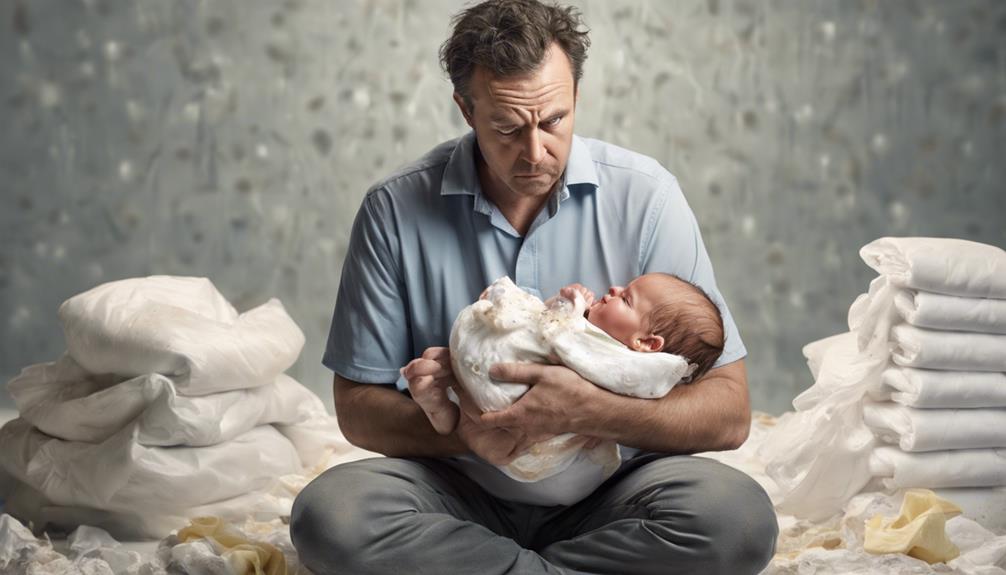As we navigate the waters of caring for our little ones, we encounter a murky situation that can leave us feeling adrift: managing watery newborn poop.
With its ever-flowing nature, this common concern can stir up uncertainty and concern in parents. But fear not, for within these pages lies a compass to guide you through the turbulent seas of infant diarrhea.
Let's sail together towards calmer shores, armed with knowledge and practical tips to steer us through this messy yet manageable journey.
Key Takeaways
- Monitor hydration and use oral rehydration solutions.
- Change diapers frequently and observe closely.
- Seek medical help for signs of dehydration or persistent watery poop.
- Address feeding issues, infections, or allergies causing watery stools.
Causes of Watery Newborn Poop
Watery newborn poop can stem from various factors, including infections like rotavirus or E. coli. These infections can disrupt the delicate balance of the baby's digestive system, leading to loose stools. Additionally, changes in the baby's diet, such as introducing new foods or experiencing formula intolerance, can also result in watery poop. Antibiotics, whether taken by the baby or the breastfeeding mother, can have a similar effect by altering the gut flora. Viral gastroenteritis, including common culprits like rotavirus, is known to cause watery newborn poop as well.
Ensuring adequate hydration and addressing the root cause, whether it be an infection, dietary issue, or antibiotic-related, is key to resolving the issue and promoting your baby's health and comfort. If your baby is experiencing watery stools due to any of these factors, consulting with a healthcare provider for proper management is important. Monitoring these causes closely is necessary, as persistent watery newborn poop can quickly lead to dehydration.
Symptoms to Watch For

Monitoring newborns for symptoms is essential in identifying potential issues related to their watery stools. When observing newborns with watery poop, it's vital to pay attention to the following signs:
- Changes in Color: Keep an eye out for any unusual color changes in the poop, as this could indicate underlying health issues.
- Signs of Dehydration: Look for decreased urine output, dry mouth, and increased fussiness, which may signal dehydration in newborns passing watery stools.
- Altered Consistency: Note any significant changes in the consistency of the poop, as consistency variations can be a sign of digestive problems.
- Frequency of Stools: Monitor the frequency of watery stools; excessive frequency might indicate an issue with the newborn's digestive system.
Newborns are particularly vulnerable to digestive issues due to their immature digestive systems. If you notice any signs of discomfort, lethargy, or persistent diarrhea in newborns with watery poop, it's advisable to seek medical advice promptly.
Diagnosing Watery Poop in Newborns
When evaluating newborns with loose stools, healthcare providers typically assess various symptoms to determine the underlying cause of watery poop. Watery stools in babies can sometimes indicate diarrhea, especially if the consistency remains consistently loose and watery.
It's important to monitor the frequency and texture of your baby's poop to distinguish between normal bowel movements and potential issues like diarrhea. Diagnosing watery poop in newborns may involve looking for additional signs such as fever, dehydration indicators, and changes in behavior that could suggest an underlying problem.
Infections, allergies, sensitivities, or alterations in feeding patterns are common culprits of watery stools in babies. Seeking medical advice is essential if watery poop persists, as healthcare professionals can provide guidance on managing dehydration, addressing infections, identifying allergies, or adjusting feeding practices to guarantee your baby's health and well-being.
Managing Watery Stools at Home
To effectively manage watery stools at home, maintaining proper hydration for the baby through frequent breastfeeding or formula feeding is essential. In addition to hydration, there are a few key strategies to contemplate:
- Use oral rehydration solutions: Products like Pedialyte can help replace lost fluids and electrolytes, aiding in the recovery process.
- Change diapers frequently: This practice helps prevent diaper rash, which can occur due to prolonged exposure to watery stools.
- Monitor the baby closely: Keep an eye on their overall well-being and watch for signs of dehydration, such as decreased urination or listlessness.
- Contact a healthcare provider if needed: If watery stools persist despite these measures or if you observe concerning symptoms of dehydration, reaching out to a healthcare provider is vital for further guidance and support.
When to Seek Medical Help
If your newborn exhibits concerning symptoms like signs of dehydration or distress alongside watery poop, seeking medical help promptly is essential. Signs of dehydration such as a sunken fontanelle or decreased urine output require immediate medical attention.
Additionally, contact a healthcare provider if your newborn experiences watery poop accompanied by fever, vomiting, or blood in the stool. It's important to seek immediate medical attention if your newborn shows signs of distress, lethargy, or extreme fussiness alongside watery poop.
Should your newborn's watery poop persist for more than 24 hours despite feeding adjustments or other interventions, consulting a doctor is recommended. Don't hesitate to reach out to a healthcare professional if you have concerns about the frequency or consistency of your newborn's watery poop.
Frequently Asked Questions
What Should I Do if My Newborn Has Watery Poop?
If our newborn has watery poop, we must monitor for dehydration signs like decreased urine output. Keep feeding as usual unless advised otherwise. Seek medical advice if watery poop persists beyond a few days for proper evaluation and guidance.
How Do You Settle Watery Poop?
When facing watery poop in newborns, we address it by adjusting hydration, observing for dehydration, seeking medical guidance if needed, maintaining hygiene, and considering dietary changes. It's important to stay proactive and seek support when necessary.
Does Breast Milk Make Baby Poop Watery?
Breast milk, rich in lactose, often leads to watery newborn poop. This is normal and shows a healthy digestive system. Breastfeeding creates soft, yellow, seedy stools. Embrace the runny nature; it's a sign of your baby's well-being.
How Can I Stop My Breastfed Baby From Having Diarrhea?
To help our breastfed baby avoid diarrhea, we focus on maintaining a balanced diet, staying hydrated, and ensuring proper latch and positioning during breastfeeding. Consulting a healthcare provider or lactation consultant can provide valuable guidance and support.
Conclusion
In the journey of managing watery newborn poop,
we must navigate through the murky waters of infant health with knowledge as our compass.
Like skilled sailors, we must chart a course towards understanding the causes,
recognizing the symptoms, and taking action when necessary.
By staying vigilant and proactive,
we can steer clear of rough seas and guide our little ones safely to calmer shores of health and well-being.








